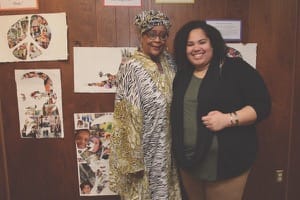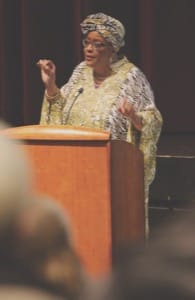Throughout her presentation at Bethel’s Martin Luther King Jr. Day program Jan. 18, Michelle Armster would pause to call out several names.
“Sandra Bland. Renisha McBride. Shantel Davis.”
“Lena Baker. Kimani Gray. Tanisha Anderson.”
Armster, the transitional executive director for Mennonite Central Committee Central States, noted that when she was contacted about being the keynote speaker for the annual celebration, “I was mourning the death of Sandra Bland, an African-American woman murdered on her way to starting a job at her alma mater.”
Bland was pulled over by Waller County, Texas, police on July 10, 2015, on a minor traffic violation, arrested for “talking back” and three days later found dead in her cell.
“[In recent years,] the incarceration and state-sanctioned murder of African-American and indigenous women has doubled that of men,” Armster said—the reason for the title of her address, “The New Jane Crow.”
Armster briefly traced the history of mass incarceration in the United States.
“I could go on and on about the origins of modern-day police and policing, the racial disparity in sentencing, even about the poisoning of the children and residents of Flint, Michigan, which is 60 percent African-American—the many ways people of color are being terrorized. African Americans, indigenous people, Latinos. Terrorizing is not a thing of the past.
“The number of women being incarcerated has had a cost in terms of the lives of children,” she said. “Often, they are incarcerated for ‘minor drug offenses.’ Most of them are mothers, many the sole caregivers for their children.
“Dr. King … said: ‘Our lives begin to end the day we become silent about the things that matter.’ So what can you do to make your life matter? I have a couple of suggestions.”
Armster first encouraged reading The New Jim Crow by Michelle Alexander, which covers, among other things, mass incarceration and how U.S. drug laws and the War on Drugs continue to disenfranchise African-American males.
 Michelle Armster, left, and Jean Butts ’09 of Bethel’s student life staff pose after the 2016 Martin Luther King Jr. Day celebration with artwork by Slate Creek Elementary School students.
Michelle Armster, left, and Jean Butts ’09 of Bethel’s student life staff pose after the 2016 Martin Luther King Jr. Day celebration with artwork by Slate Creek Elementary School students.Second, she urged her audience to “get involved with the Newton Community for Racial Justice. They are doing amazing things. They recognize that unless we do the work, nothing will change. They need people who care, who want to choose a life that matters.
“Get involved in organizations working at reforming the criminal justice system. It’s broken. People and lives are being damaged—when you talk about 30 years, you’re talking about a whole generation.”
Last fall, the Newton Community for Racial Justice sponsored a Roots of Justice anti-racism training at Shalom Mennonite Church in Newton. Two participants spoke briefly about their experience with the training.
“I didn’t think my opinion would matter because I’m young, and I didn’t think people wanted to listen to me,” said Bethany Montoya, Bethel freshman from Wilmer, Texas.
“I found out my opinion did matter, and adults came to me and asked me what I thought and what could be done.
“I learned that a lot of people don’t see racism—I found out I didn’t. I thought it was normal for people to tell me it was wrong to speak Spanish. I found out that it was taking my culture away, and that it was not OK.”
Jean Butts ’09 from Bethel’s student life staff and the main planner for the Martin Luther King Jr. Day events, closed the evening by playing a song from the soundtrack of the 2014 feature film Selma, “Glory” by rapper Common and John Legend.
A repeating line says: “The war is not over, victory isn’t won, we’ll fight on to the finish, then when it’s all done, We’ll cry Glory!”
“The situations we’re dealing with in our society are controversial,” Butts said. “Dr. King was controversial, too. He was seen as a radical.
“It’s a part of carrying on his spirit, to be controversial and unpopular. Are you ready to be unpopular, to carry on in a town-of-Selma [way]?”
